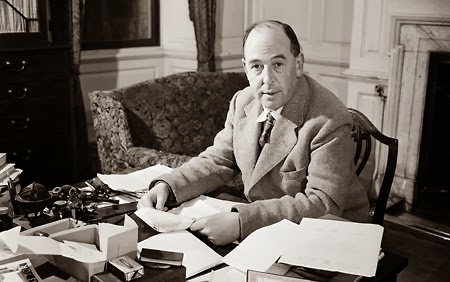 |
| C. S. Lewis (1898-1963) |
"All joy (as distinct from mere pleasure, still more amusement)
emphasizes our pilgrim status: always reminds, beckons, awakens desire. Our
best havings are wantings."
--Letters of C. S. Lewis, p.
441
"God gives what He has, not what He has not: He gives the happiness
that there is, not the happiness that is not. To be God - to be like God and to
share His goodness in creaturely response - to be miserable - these are the
only three alternatives. If we will not learn to eat the only food that the
universe grows - the only food that any possible universe can ever grow - then
we must starve eternally."
--The Problem of Pain, p.
47
“What Satan put into the heads of our remote ancestors was the idea that
they could 'be like gods' - could set up on their own as if they had created
themselves - be their own masters - invent some sort of happiness for
themselves outside God, apart from God. And out of that hopeless attempt has
come nearly all that we call human history - money, poverty, ambition, war,
prostitution, classes, empires, slavery - the long terrible story of man trying
to find something other than God which will make him happy. The reason why it
can never succeed is this. God made us: invented us as a man invents a machine.
A car is made to run on petrol, and it would not run properly on anything else.
Now God designed the human race to run on Himself. He Himself is the fuel our
spirits were designed to burn, or the food our spirits were designed to feed
on. There is no other. That is why it is just no good asking God to make us
happy in our own way without bothering about religion. God cannot give us
happiness and peace apart from Himself, because it is not there. There is no
such thing.”
--Mere Christianity, p. 50
“I think one may be quite rid of the old haunting suspicion—which raises
its head in every temptation—that there is something else than God, some other
country into which he forbids us to trespass, some kind of delight which he
‘doesn’t appreciate’ or just chooses to forbid, but which would be real delight
if only we were allowed to get it. The thing just isn’t there. Whatever
we desire is either what God is trying to give us as quickly as he can, or else
a false picture of what he is trying to give us, a false picture which would
not attract us for a moment if we saw the real thing. . . . He knows what we
want, even in our vilest acts. He is longing to give it to us. . . .The truth
is that evil is not a real thing at all, like God. It is simply good spoiled.
. . . You know what the biologists mean by a parasite—an animal that lives on
another animal. Evil is a parasite. It is there only because good is
there for it to spoil and confuse.”
--They Stand Together: The Letters of C. S. Lewis to Arthur Greeves
(1914-1963), p. 465. Italics original.
“The New Testament has lots to say about self-denial, but not about
self-denial as an end in itself. We are told to deny ourselves and to take up
our crosses in order that we may follow Christ; and nearly every description of
what we shall ultimately find if we do contains an appeal to desire. If there
lurks in most modern minds the notion that to desire our own good and earnestly
to hope for the enjoyment of it is a bad thing, I submit that this notion has
crept in from Kant and the Stoics and is no part of the Christian faith. Indeed,
if we consider the unblushing promises of reward and the staggering nature of
the rewards promised in the Gospels, it would seem that Our Lord finds our
desires not too strong, but too weak. We are half-hearted creatures, fooling
about with drink and sex and ambition when infinite joy is offered us, like an
ignorant child who wants to go on making mud pies in a slum because he cannot
imagine what is meant by the offer of a holiday at the sea. We are far too
easily pleased!”
--The Weight of Glory and Other Addresses, p. 25-26.

2 comments:
I have always liked the end of the last quote about choosing mudpies over a holiday at the sea and being far too easily pleased.
I have always liked the end of the last quote about preferring mudpies over a holiday at the sea. Indeed, "we are far too easily pleased!"
Post a Comment